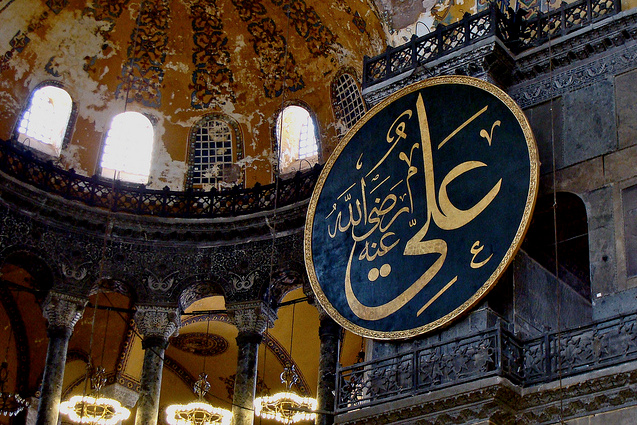
It is reported that on one occasion, a beggar came to Hazrat Ali (radhiyallahu ‘anhu) and asked him for some money. Hazrat Ali (radhiyallahu ‘anhu) thus turned to one of his two sons, either Hazrat Hasan or Hazrat Husain (radhiyallahu ‘anhuma), and said, “Go to your mother and tell her that I said, ‘I left six dirhams with you, so send one dirham from the six.’”
The son thus went home to his mother, Hazrat Faatimah (radhiyallahu ‘anha), and conveyed his father’s message, but on returning, he did not have the dirham with him. He said to his father, Hazrat Ali (radhiyallahu ‘anhu), “My mother said that you had left the six dirhams for purchasing flour.” Hearing this, Hazrat Ali (radhiyallahu ‘anhu) said, “A servant’s imaan will not become true and perfect until he has more reliance on that which is in the hand of Allah Ta‘ala compared to what he possesses (i.e. his reliance upon Allah Ta‘ala being the One who fulfills his need should be more than the reliance he has upon his wealth being the means to fulfill his need).”
Hazrat Ali (radhiyallahu ‘anhu) then said to his son, “Go to your mother, and tell her to send all six dirhams.” He thus went to his mother and then returned with the six dirhams which Hazrat Ali (radhiyallahu ‘anhu) handed to the beggar.
Barely a moment later, as Hazrat Ali (radhiyallahu ‘anhu) began to sit, a man passed by with a camel which he was selling. Hazrat Ali (radhiyallahu ‘anhu) asked him, “How much are you selling the camel for?” The man replied, “I am selling it for one hundred and forty dirhams.” Hazrat Ali (radhiyallahu ‘anhu) then purchased the camel from him. After purchasing the camel, Hazrat Ali (radhiyallahu ‘anhu) said, “Tie the camel here, and we will pay you later.” The man thus tied the camel and departed.
Thereafter, another man passed by, and on seeing the camel, he asked, “Who does this camel belong to?” Hazrat Ali (radhiyallahu ‘anhu) replied, “It belongs to me.” The man asked, “Are you selling it?” When Hazrat Ali (radhiyallahu ‘anhu) replied that he was selling it, the man asked, “How much are you selling it for?” Hazrat Ali (radhiyallahu ‘anhu) responded, “I am selling it for two hundred dirhams.” The man was satisfied with the price and thus accepted the offer and concluded the sale saying, “I have bought it from you.” He then handed the two hundred dirhams to Hazrat Ali (radhiyallahu ‘anhu), took his camel and departed.
Hazrat Ali (radhiyallahu ‘anhu) then went to the man who had sold him the camel and paid him the one hundred and forty dirhams which he owed him. Thereafter, he returned home to his respected wife, Hazrat Faatimah (radhiyallahu ‘anha), with the sixty dirhams that he had made as profit.
When Hazrat Faatimah (radhiyallahu ‘anha) saw the sixty dirhams, she asked him, “What is this? Where did this money come from?” Hazrat Ali (radhiyallahu ‘anhu) replied, “This is what Allah Ta‘ala has promised us, through the following words revealed upon the blessed tongue of Rasulullah (sallallahu ‘alaihi wasallam).”
Hazrat Ali (radhiyallahu ‘anhu) then recited the following verse of the Qur’aan Majeed:
مَنۡ جَآءَ بِالۡحَسَنَةِ فَلَهُ عَشۡرُ اَمۡثَالِهَا
The one who comes with a good deed, he will receive ten times as much (Surah An’aam v. 160)
In other words, Hazrat Ali (radhiyallahu ‘anhu) explained to Hazrat Faatimah (radhiyallahu ‘anhu) that when he spent six dirhams in sadaqah, then Allah Ta‘ala replaced it with ten times more, and hence he now had sixty dirhams.
(Hayaat-us-Sahaabah 2/191)
 Ihyaaud Deen An Effort to Revive Deen in Totality
Ihyaaud Deen An Effort to Revive Deen in Totality



